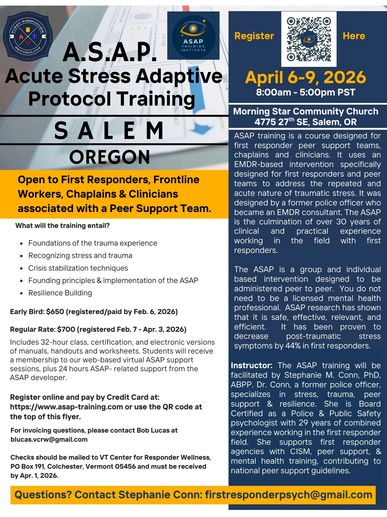Organizational Training
Acute Stress Adaptive Protocol (ASAP) April 6-9, 2026
Acute Stress Adaptive Protocol (ASAP) April 6-9, 2026

Instructor: Stephanie M. Conn
Hosted by: Morning Star Community Church
Venue: Morning Star Community Church
4775 27th Ave SE
Salem, OR 97302
Join us for a 4-day in-person ASAP Peer Support Training event in the Salem, OR area. This training will delve into psychoeducation around stress and trauma, explore why trauma is unique in first responders, and equip you with confidence in administering ASAP to your peers. Our experienced trainers will cover a range of topics to enhance your effectiveness as a peer supporter. Don’t miss this opportunity to connect with like-minded individuals and make a positive impact in your community. Register now to secure your spot!
Acute Stress Adaptive Protocol (ASAP) May 4-7, 2026
Acute Stress Adaptive Protocol (ASAP) April 6-9, 2026
Instructor: Stephanie M. Conn
Hosted by: Kirkland Police Department
Venue: Kirkland Justice Center
11750 NE 118th ST
Kirkland, WA 98034
Join us for a 4-day in-person ASAP Peer Support Training event in Kirkland, WA . This training will delve into psychoeducation around stress and trauma, explore why trauma is unique in first responders, and equip you with confidence in administering ASAP to your peers. Our experienced trainers will cover a range of topics to enhance your effectiveness as a peer supporter. Don’t miss this opportunity to connect with like-minded individuals and make a positive impact in your community. Register now to secure your spot!
(Re)Building Effective Peer Support Teams. Virtual Course March 13, 26 3-5pm (PDT)
Wired but Tired: Recalibrating the First Responder Nervous System Virtual Course April 3, 26. 1-3pm

This course offers guidance for developing and maintaining an effective peer support team. It begins by describing a robust onboarding process that ensures the suitability and trustworthiness of its members. Guidance is offered for ongoing training, clinical advisory support, and participation expectations to maintain team effectiveness. It includes recommendations for legal and ethical issues involving confidentiality/privilege, interagency support, healthy boundaries, and leave programs. It concludes with recommended specialty roles within the team to better meet the needs of agency peers.
Wired but Tired: Recalibrating the First Responder Nervous System Virtual Course April 3, 26. 1-3pm
Wired but Tired: Recalibrating the First Responder Nervous System Virtual Course April 3, 26. 1-3pm
Wired but Tired: Recalibrating the First Responder Nervous System Virtual Course April 3, 26. 1-3pm

First responder work demands constant vigilance, rapid decision-making, and exposure to chronic stress and trauma. Over time, these demands reshape the nervous system—often in ways that are adaptive on the job but costly to health and performance. What begins as an occupational necessity can become a health hazard. I explain how and why the nervous system changes, causing insomnia, impaired focus and decision-making, hypervigilance, and difficulty being still. You'll learn strategies to reset and optimize nervous system functioning for improved performance, health, and career longevity.
Acute Stress Adaptive Protocol (ASAP) Refresher VIRTUAL. Dec 12, 2025, 2-4pm PDT
Wired but Tired: Recalibrating the First Responder Nervous System Virtual Course April 3, 26. 1-3pm
Acute Stress Adaptive Protocol (ASAP) Refresher VIRTUAL. Dec 12, 2025, 2-4pm PDT

This 2-hour virtual course is for those ASAP-trained peer support members, chaplains & clinicians who hope to maintain their skills.
Course Outline:
- Review of ASAP
- Updates to protocol
- Recent research findings
- Current implementations / agency usage
- Demonstration of an ASAP
- Debriefing of process
- Q&A
Group-Assisting Individuals (GRIN)
Wired but Tired: Recalibrating the First Responder Nervous System Virtual Course April 3, 26. 1-3pm
Acute Stress Adaptive Protocol (ASAP) Refresher VIRTUAL. Dec 12, 2025, 2-4pm PDT

This 3-day course combines ICISF’s Assisting Individuals in Crisis & Group Crisis Intervention. The course is 27 hours (10-hour days, including 1-hour lunch break).
It is designed to present the core elements of a comprehensive, systematic and multi-component crisis intervention curriculum. Further, it prepares participants to understand a wide range of crisis intervention services for both the individual and for groups. Fundamentals of Critical Incident Stress Management (CISM) will be outlined, and participants will leave with the knowledge and tools to provide several group crisis interventions, specifically demobilizations, defusings and the Critical Incident Stress Debriefing (CISD). The need for appropriate follow-up services and referrals, when necessary, will also be discussed.
Increasing Resilience in First Responders
Building And Restoring Resilience Through Peer Support & C.I.S.M.
Building And Restoring Resilience Through Peer Support & C.I.S.M.

This course will describe how first responders can take proactive and responsive steps to adaptively respond to chronic stress and trauma. A discussion of the risk and protective factors that influence wellbeing is offered to assist first responders to understand their own experiences with trauma and stress and how to mitigate their impact. This will include a plain-language discussion of the neurobiology of trauma. Resilience research is applied to the unique issues of first responder work, generating practical strategies to promote resilience. This discussion will be fortified with practical exercises that assess current levels of resilience and map a resilience-building plan.
Building And Restoring Resilience Through Peer Support & C.I.S.M.
Building And Restoring Resilience Through Peer Support & C.I.S.M.
Building And Restoring Resilience Through Peer Support & C.I.S.M.

In this course, I discuss the complementary roles of proactive resilience building (peer support) and critical incident response (CISM). Attendees will learn how to use peer support to inoculate co-workers from the impacts of daily stressors and traumas, further inoculating them from future critical incident stress. To achieve this, they will learn how to identify the common and uncommon signs of mental health issues affecting co-workers and how to have helpful conversations to support them. They will also learn how to manage unique challenges in the supporter role such as confidentiality, suicidality, disciplinary investigations, and healthy boundaries. Role-play exercises will fortify learning, allowing for immediate feedback to improve interpersonal effectiveness.
Trauma-Informed Peer Support
Building And Restoring Resilience Through Peer Support & C.I.S.M.
Sleep Shouldn't Be a Nightmare

This training provides a straightforward, practical overview of the science behind chronic stress and cumulative trauma—common experiences in first responder work. Participants will learn how to recognize and normalize trauma reactions in themselves and their peers, helping to reduce stigma, ease feelings of shame, and promote healthier coping strategies. The course uses motivational interviewing and strengths-based communication to support resilience and peer connection. It also reviews evidence-based programs designed to address both acute and ongoing trauma, with guidance on how first responders can access specialized training or help connect colleagues to qualified providers when needed.
Sleep Shouldn't Be a Nightmare
Sleep Shouldn't Be a Nightmare

This training addresses the unique sleep challenges faced by first responders, including trouble falling or staying asleep, early awakenings, and recurring nightmares. Participants will learn the neuroscience behind sleep and how the nervous system affects rest and recovery. The course offers practical, evidence-based strategies to improve sleep quality—both during and outside of shifts—including techniques to wind down after high-adrenaline calls, shift work adaptations, and nervous system regulation throughout the day. Additional topics include strategic napping, the effects of nutrition and exercise on sleep, and the role of medications and supplements. Tips for changing sleep schedules will also be offered. The session also provides resources for ongoing support and improving long-term sleep health.
Suicide Awareness & Prevention

In this course, I will discuss how to identify that a peer might be at risk for suicide. This will include a discussion of the research on risk factors contributing to first responder suicide. Two models of suicide, the gradual and impulsive, will be discussed so that attendees have a comprehensive understanding of how first responder suicide can manifest. We will discuss how to recognize, intervene, and connect peers to resources. Local and national resources will be offered.
Suicide Awareness & Prevention for Peer Team Members

In this course, I will discuss how to identify that a peer might be at risk for suicide. This will include a discussion of the research on risk factors contributing to first responder suicide. Two models of suicide, the gradual and impulsive, will be discussed so that attendees have a comprehensive understanding of how first responder suicide can manifest. We will discuss how peer supporters can recognize, intervene, and connect peers to resources. Local and national resources will be offered. Additionally, we will discuss recommended policies and procedures relating to voluntary
and involuntary emergency support for a suicidal peer.
Contact Us
Better yet, see us in person!
We love our customers, so feel free to visit during normal business hours.
First Responder Psychology
Recent Feedback on Increasing Resilience Course
"Finally! Someone who has 'been there, done that'. Great to hear from someone who knows all sides. Stephanie speaks our language & calls it like it is."
"I really enjoyed the instructor. She brings credibility to the training. She's not full of shit!"
"It's the first training I've attended that specifically knows about and includes dispatchers. Thank you!"
"Great info, liked all topics, instructor could relate to us and is very knowledgeable about this topic. Enjoyed the class. Everyone needs to take this class."
"I wish I could have had this training early on in my career.
